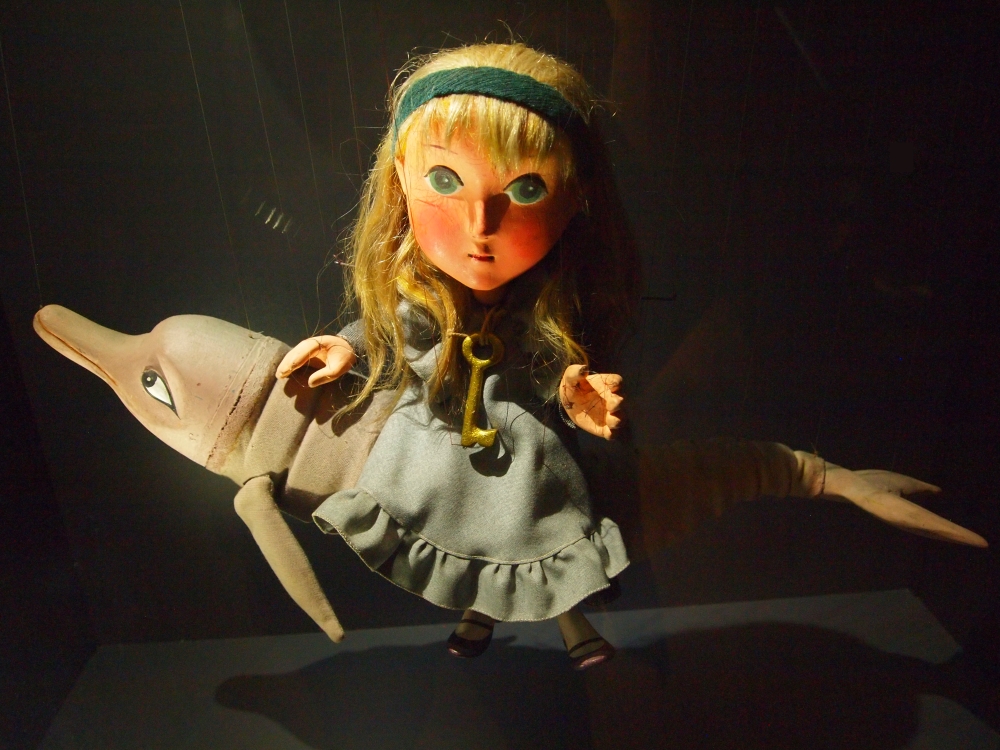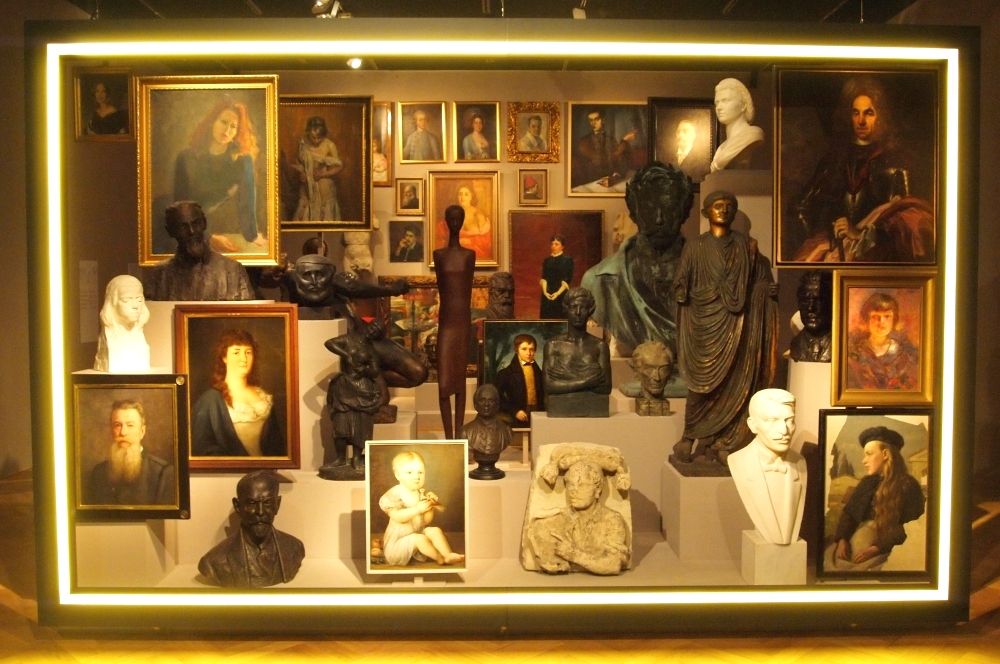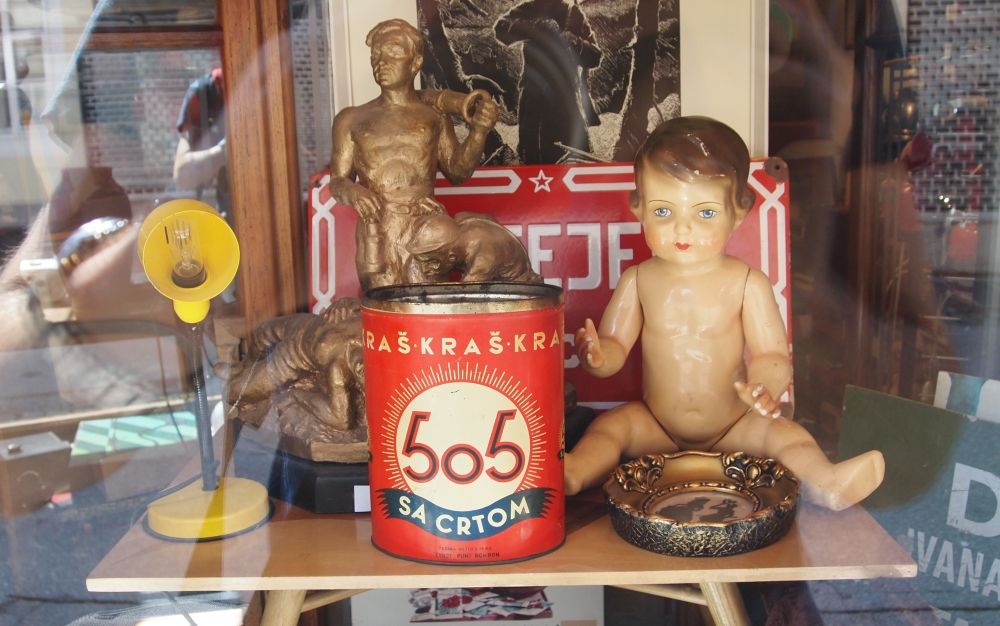News
STA, 19 January 2019 - Maribor plans to join forces with nearby towns this year to expand what it has to offer to tourists and keep visitors in the region longer. Slovenia's second biggest city is betting on its assets in sports, culture, wine and cuisine, city tourism and conference tourism.
The Maribor - Pohorje Tourism Institute is working on a new four-year regional tourism strategy as the current one expires in 2020.
Maribor and 22 municipalities in the region will strive to attract guests with experiences they are offering in sports, culture, wine and cuisine, city tourism and conference tourism.
The Institute's head Doris Urbančič Windisch thinks the region should emphasise what distinguishes it from the rest of Slovenia. "We'll encourage our guests to stay at least two or three nights," she told the STA.
Urbančič Windisch sees great potential in Maribor's Old Vine, the world's oldest vine. The Old Vine can be a starting point for many gastronomic and cultural experiences, including in cooperation with nearby towns, she said.
Brochures presenting the region's sports infrastructure and facilities are also under way.
The data on nights and arrivals for 2018 are not in yet, but the institute expects the growth recorded in the first ten months to continue.
Between January and the end of October, 30% more nights were generated in Maribor (379,577) and 13% more arrivals (177,799). The Maribor - Pohorje destination recorded 29% more nights (486,792) and 12% more arrivals (218,876) compared to the same period in 2017.
The Tourism Institute presented its new visual identity last year and will launch a new website this year. It will also organise a number of workshops and activities for those working in culture and tourism to create interesting holiday packages for tourists.
Urbančič Windisch highlighted inappropriate working hours of museums and low entrance fees which she says do not reflect the quality of service.
Another problem for Maribor is the lack of a five-star hotel and other infrastructure for high-end guests.
All out posts tagged "travel and tourism" can be found here
STA, 19 January 2018 - Celebrations of the centenary of Prekmurje's reunification with Slovenia, to be marked on 17 August, have got under way with the launch of a book about the role the US played at the 1919 Paris Peace Conference for the region to be awarded to Slovenia.
Prekmurje in the Whirlpool of the 1919 Paris Peace Conference (Prekmurje v Vrtincu Pariške Mirovne Conference 1919) focuses on the role of the US and Major Douglas W. Johnson in setting the Slovenian or Prekmurje borders after the First World War.
Its author Uroš Lipušček, an acclaimed journalist, said at yesterday's book launch that Johnson had played a very important role which had been overlooked.
"When it comes to Prekmurje, he absolutely played the key role," Lipušček said about Johnson, a university professor and US President Thomas Woodrow Wilson's cartographer.
Johnson, whom Lipušček labelled a very educated man, attended two sessions of the territorial commission, insisting Prekmurje be given to the SHS Kingdom.
"When he saw Wilson will yield to the Italian pressure and give Primorska to the Italians and that due to Wilson's stubbornness we will also lose Koroška, he put pressure on the US delegation and Wilson, saying they have lost everything, so they must not lose Prekmurje."
Lipušček believes Slovenians were lucky to have Johnson at these meetings rather than somebody else from the US delegation, not all of whose members were in favour of Slovenians or Yugoslavians.
The book also speaks about efforts of Catholic intellectuals for Prekmurje to become part of Slovenia. Lipušček said they had convinced the US delegation to back Prekmurje's unification with Slovenia.
Addressing the event, the chair of the board for Prekmurje reunification centenary celebrations, Milan Kučan, said the anniversary should be directed towards the future.
Kučan, Slovenia's former president, who comes from Prekmurje, said it should affirm Prekmurje the way it had been when becoming part of Slovenia - multicultural, multi-religious and multi-civilisational.
The book launch was held in Murska Sobota, the regional capital of Prekmurje, on Friday, 100 years to the day since the Paris Peace Conference opened.
At the peace conference, Slovenia lost the region of Primorska and after the 1920 plebiscite also Koroška, but got part of Primorska back after the Second World War.
The celebrations will culminate with a ceremony on Prekmurje Reunification Day on 17 August, marking the day when military authorities handed power to civilians.
STA, 21 January 2019 - Slovenian MEPs agree with the general assessment that this year's European elections will be decisive for the future of the EU as populist and Euro-sceptical parties are gaining on strength while Brexit is raising the awareness of the benefits of the EU membership, which large political groups in the European Parliament will try to emphasise.
Romana Tomc (SDS/EPP) said that "Europe is in a position when it is really important which political groups will achieve the best result - whether it will be the groups which advocate a better Europe and survival of the EU or European sceptics who promote the idea that the EU needs to be weakened further."
Tomc thus wants that the Democrats (SDS), the largest opposition party in the Slovenian parliament, make a candidate list as soon as possible and manage to convince the voters that they should go to the polls this May.
Lojze Peterle (NSi/EPP) too wishes that the discussion on candidates would turn into a debate on European topics as soon as possible. "Slovenia needs to agree on what vision of Europe it will promote," he believes.
Tanja Fajon (SD/S&D) thinks that the candidates, including her, would need to explain to the voters that this year's European elections are about "whether we want a social Europe, whether we want peace and stability and whether democracy will win over authoritarianism."
According to Fajon, the question is also "whether we will give in to fear or whether we want hope". "These will be the topics that the Social Democrats (SD) will be addressing in the campaign."
Analysts have noted that the turnout in the elections will depend on whether the candidates and political parties will be able to address in the campaign the topics that interest the voters.
According to an Eurobarometer survey, almost 60% of Slovenian voters want to hear answers, solutions and ideas from the field of the economy, followed by unemployment among the young and social protection of the EU citizens.
Milan Zver (SDS/EPP) is convinced that the turnout in Slovenia and the EU will be considerably higher this time also because all political parties dedicate more attention and money to the elections, while Euro-sceptical parties are also mobilising the voters.
Many pundits have warned nevertheless that other topics will also be important in the campaign, with the ALDE and Greens groups stressing that the issue of climate change should also be put on the agenda.
Igor Šoltes (Greens), who will go to the elections with his own list, thinks that the campaign would need discuss the protection of clean drinking water and food and the rise of hate speech and preservation of a cultured, civilised discourse.
Franc Bogovič (SLS/EPP) believes that concrete answers to concrete questions need to be found. Slovenia needs to answer the question of how to be a good building element of the EU, while being able to utilise funds and other instruments, he added.
Ivo Vajgl (DeSUS/Alde) added that Slovenia should already start thinking about the initiatives it will present as part of its presidency of the EU in the second half of 2021.
The Slovenian MEPs spoke to the Slovenian media as part of the latest session of the European Parliament in Strasbourg.
Below is a review of the headlines in Slovenian dailies for Monday, January 21, 2019, as summarised by the STA:
DELO
Protests in Serbia
"Serbs shouting, Vučić getting ready for election": Although Serbian politicians usually do not work on Sundays, the leadership of Aleksandar Vučić's party SNS held a meeting yesterday, a day after the seventh weekend of protests in the country, to discuss election. (front page, 3)
Protests in Europe
"Weekend marked by protests": The past weekend saw thousands of Europeans take to the streets, as the rallies in France and Hungary continued and the Greek rightists protested against the Macedonia name change in Athens. (front page, 4)
DNEVNIK
Government ratings
"PM Šarec and his LMŠ beat competition in all categories this time": The results of the first Vox Populi poll in 2019 show the government of Marjan Šarec enjoying a record high support, Šarec's party, the LMŠ, topping the party rankings and himself dethroning President Borut Pahor as the most popular politician. (front page, 2-3)
Fate of retailer Mercator
"More about the fate of Mercator will be known at the end of the month": After a few months of peace, the retailer Mercator is in for some turbulence. Its fate as part of Croatia's Agrokor is expected to be decided at the end of January.
Protests in Greece
"Greece: Rough protests in Athens against new Macedonian name deal": Some 100,000 people from all over Greece gathered in Athens on Sunday to protest against Macedonia's new name. (front page, 6)
FINANCE
Subsidies
"These calls for applications are still open this winter": The paper brings an overview of calls for applications for EU and state funding. (front page, 12-13)
Brexit
"What will happen with transactions, accounts, insurances and companies if hard Brexit happens?": A spread on possible scenarios related to Brexit, highlighting issues that will affect companies and people. (front page, 2-4)
Healthcare
"Criticism on irregularities in purchase of CT scans": The Health Ministry is buying ten CT scans for seven hospitals, the value of which has been estimated at EUR 10m amid criticism that the call for application has been rigged. (front page, 7)
VEČER
Spade of the Year
"No to divisions between yours and ours": A statement on the relationship between politicians and experts by Verica Trstenjak, a former advocate general at the Court of Justice of the EU, has won the Spade of the Year award by the newspaper publisher Večer for the statement that best captured the zeitgeist in 2018. (front page, 2-3, 25)
Innovation
"Social innovation for progress": Next to technological innovation, social innovation is crucial for the progress of society. (front page, 4)
Law enforcement
"From action to ruling in (just) two days": The project of a fast track criminal procedure was conceived in 2012, and last year, the Murska Sobota District Court started implementing it intensively. (front page, 12-13)
There’s a new look to what’s on… this week, as we’ve added a table of contents and hyperlinks to make the whole thing more user friendly, and finally gotten rid of some long-standing, well-loved typos, while adding some new ones for eagle-eyed readers to spot. You can see all the editions of these guides here, and all our stories tagged Ljubljana here.
As ever, clicking on the venue names in the sections below should get you more details with regard to the time, price and location, as well as other events on at this place in whatever week you're here. Finally, if there's something you want to promote in a future edition of What's on in Ljubljana please get in touch with me at flanner(at)total-slovenia-news.com
- Cinemas and films
- Clubbing
- Live music
- Opera, theatre and dance
- Harm reduction and drug testing
- Some fun facts about the city and its castle…
- Things to do with children
- LGBT+ Ljubljana
- Museums and galleries
- Other things to do in Ljubljana
- Daytrips
- Getting around
Cinemas and films
You can read about all the cinemas in town here, while a selection of what’s playing this week is below, and note that kid’s movies tend to be shown in dubbed versions, so do check before driving out to a multiplex and dropping off the young ones if they can't understand Slovene. Parents should also pay attention to Kinobalon, which is Kinodvor's regular weekend series of film screenings and events for children, from babies on up, with special parent/child events, "first time in a cinema" screenings, and babysitting. Learn more about it here, and see the current schedule here.
Kinodvor – The arts cinema not far from the train station is showing, among other features, The Children Act, Women at War, The Favourite, Maria by Callas and Climax.
Kinoteka – This revival cinema isn’t far from Kinodvor, at the train station end of Miklošičeva, is showing Von Trier’s Europa, two from Bertolucci, The Last Emperor and The Dreamers, and Fucking Åmål from Lukas Moodysson.
Kolosej - The multiplex out at BTC City Mall is playing all the big movies, which this week include The multiplex out at BTC City Mall is playing all the big movies, which this week include The Grinch (with both subbed and dubbed versions), Fantastic Beasts: The Crimes of Grindelwald, Bohemian Rhapsody, Robin Hood, Johnny English 3, A Star is Born, dubbed and subbed versions of Spider Man: Into the Spider-Verse, Aquaman, Bumblebee, a dubbed version of Asterix: Le secret de la potion magique, Second Act, Južni veter, Mary Poppins Returns, Ralph Breaks the Internet: Wreck-It Ralph 2, The Old Man & the Gun, The Favourite and The Upside. New this week are Mary Queen of Scots, Glass, and The Mule, with Serenity starting on Wednesday.
Komuna – The cinema in a basement behind Nama department store is showing Bohemian Rhapsody, Mary Queen of Scots, and The Mule.
Clubbing
Compared to some European capitals it can seem that nightlife in Ljubljana ends rather early, especially along the river, but there are still bars that stay open late and clubs were you can dance until dawn, and perhaps the best place to stumble across something interesting is the legendary Metelkova. Be aware it's a grungy kind of place and not for all tastes, but also that there's considerable variety to found within the various clubs there, from death metal to electropop, gay cabaret to art noise. You can read "the rules" of the place here.
Channel Zero – Monday night is Dub Lab, and this week it’s Domaćica - Open Mic, with a music policy of reggae, dub, riddim, dancehall and rap instrumental. Friday it’s SUBØ: Tigerbalm w. Moleskin and support.
Klub Cirkus – Friday it’s Crazy Cirkus ft. CHRNS (Armada, Proximity, LW) playing dance anthems & party hits, while Saturday night there’s Best of RNB.
Klub K4 – The klub for kool kids that’s not in Metelkova has two events this week. Friday there’s SOLVD w/ Andrey Pushkarev playing house and techno, while on Saturday klubbers can enjoy Techno Golden Oldies with DJs Dojaja, Plotz, Lazy and Djane Gaby.
Klub Gromka – Friday night is Darkland, playing new wave, dark wave, industrial, death rock, goth rock, and more.
Live music
Gala Hala – Tuesday there’s live music from Strange Cages and China Traffic. Thursday ŠKM banda will be presenting their new album. Friday it’s hip hop from Rapetek 145 with MCs Kandžija and Mirko Grozny, with DJ support from K'POW and NBGT. The week then ends of Sunday with punk rock from No Fun At All
Kino Šiška – Wednesday night you can see Stray Dogg and Eine, as seen below. The concert is being tied to the upcoming MENT festival, which starts January 30, with details here.
Klub Gromka – Thursday evening there’s a double-bill of trip hop and groove metal, with Blu.Sine and Paragoria.
Ljubljana Castle – Friday night is jazz night at the Castle, and this week the sounds will be provided by Big Band - Bend It!.
Orto Bar – Friday there seem to be two loud events at this guitar-based venue, with Drunk in Public presenting Gužva u Bajt, Spunk on Toast, Sereš, and Brez Vprašanj, along with Kadilnica of Death presenting MetalRock Akademija. Saturday there’s blues punkabilly/psychobilly with Knocksville and Clockwork Psycho.
Slovenska filharmonija – Monday there’s modern music with a programme of Vito Žuraj: Top spin, Nina Šenk: Baca (2018), Edgard Varèse: Ionisation, Andrej Makor: Silence (2018), Darijan Božič: Pop art III, and Enno Poppe: Schrauben (2018).
Opera, theatre and dance
Cankerjev dom – Tuesday it’s ballet from SNG Maribor, with a performance of Mahler’s Death in Venice. Puccini’s opera Turandot will be staged by SNG Maribor on Friday, January 25.
Gledališče IGLU - IGLU Theatre – Saturday night this group is usually putting on an English improv show somewhere in town, but it’s generally promoted after this is written, so check the Facebook before putting on your shoes.
Klub Gromka – A fairytale for adults, in Slovene, will be staged here Wednesday, 20:00, while on Friday, same time, it’s Za crknt: klovnski fjuzikl, a clown cabaret.
Mini Teater Ljubljana – The English schedule of varied performances for the month is here.
SNG Opera and Ballet – Thursday and Friday there’s Smetana’s The Bartered Bride, while on Saturday there’s Verdi’s La Traviata.
Pocket Teater Studio – Tuesday evening there's theatre with Golobi plešejo tango, then on Friday there's flamenco with Noches de TablaoNote that the number of seats is very limited, and thus you should make a reservation via pocket.teater@gmail.com or 070 325 522. The price of ticket is 20€ or 15€ for students, and includes wine throughout the evening.
Harm reduction and drug testing
Drogart is an organization that aims to minimise harm on the party scene, and offers drug-testing services and reports on their webpage. It’s in Slovene, but you can Google translate it or work things out yourself, and our story on the group is here. They recently published a story warning about three pills with very high contents of MDMA, with details (in Slovene) here. Also be aware that all the usual drugs are illegal in Slovenia.
Some fun facts about the city and its castle…
Enhance your stay in the city and impress or annoy your friends and companions by learning some obscure facts about the city here, and the castle here.
The Puppet Museum can be found in the Castle. Photo: JL Flanner
Things to do with children
You can find our Top 12 list of things to do with kids in Ljubljana here. If want to read more about the philosophy behind the wonderful House of Experiments look here, while our trip to the Museum of Illusions is documented here, and there’s always riverside walks, pizza and ice cream. With regard to the latter, take a look at our guide to six places that serve good ice cream in winter.
Mini Teater Ljubljana – The season sees a lot of puppet performances for children, in Slovene, at this theatre not far from Križanke. The English schedule for the month is here.
Ljubljana Puppet Theatre - The puppet theatre near the Central Market and next to the Castle funicular has a full programme or shows, for children and adults, with the schedule here.
LGBT+ Ljubljana
If you want to learn more about Ljubljana Pride, then take a look at our interview with its president here. If you're looking for more general links on "gay Slovenia", including a history of the scene and various projects, then you can find that here, while our stories about the community can be found here.
Klub Monokel – This lesbian bar in Metelkova is open every Friday, and this week it's Nani Mo, a club night with R36 + Volk + Estera + Torkar & Liara T'Soni.
Klub Tiffany – And the gay bar next door is also open on Fridays, while every Monday until June 2019 there's tango at 18:00. On Thursday, 20:00, there's Kavarniški večer: kviz z Milojko.
Pritličje – This seems to be the only "always open" LGBT-friendly cafe / bar / events space in town, and perhaps the country, so it's a good thing it's such a good one, open from morning to night, and with fliers and posters letting you know what's happening outside the narrow confines of, say, a general interest online what's on... guide.
Museums and galleries
Most public galleries and museums are closed on Mondays, although not the National Museum.
Plečnik's desk. Photo: JL Flanner
Plečnik’s House is worth a visit if you want to learn more about the architect who gave Ljubljana much of its character. Read about our guided tour here.
Cankerjev dom – Running until the end of February 2019 is an exhibition titled Ivan Cankar and Europe: Between Shakespeare and Kafka. This is “An examination of Cankar’s art through an analysis of influences and interpretations, and juxtaposition with contemporary European writers. The visually elaborate architectural and graphic layout, supported by audio-visual media, installation art and diverse visual highlights, offers a vivid account of Cankar’s excellence, his comprehensively exquisite aesthetic and artistic vision.”
City Museum – The Museum in French Revolution Square has an exhibition on the writer Ivan Cankar that’s on until the end of February 2019, with pictures, books and manuscripts, all presented in Slovene and English. It also has a very interesting permanent exhibition on the history of Ljubljana, from prehistoric times to the present day, with many artefacts, models and so on that bring the story alive.You can read about my visit here. Until March 2019 there's a show highlighting the work Elza Kastl Obereigner (1884-1973), a pioneer Slovenian sculptress, with an example of her work shown below.
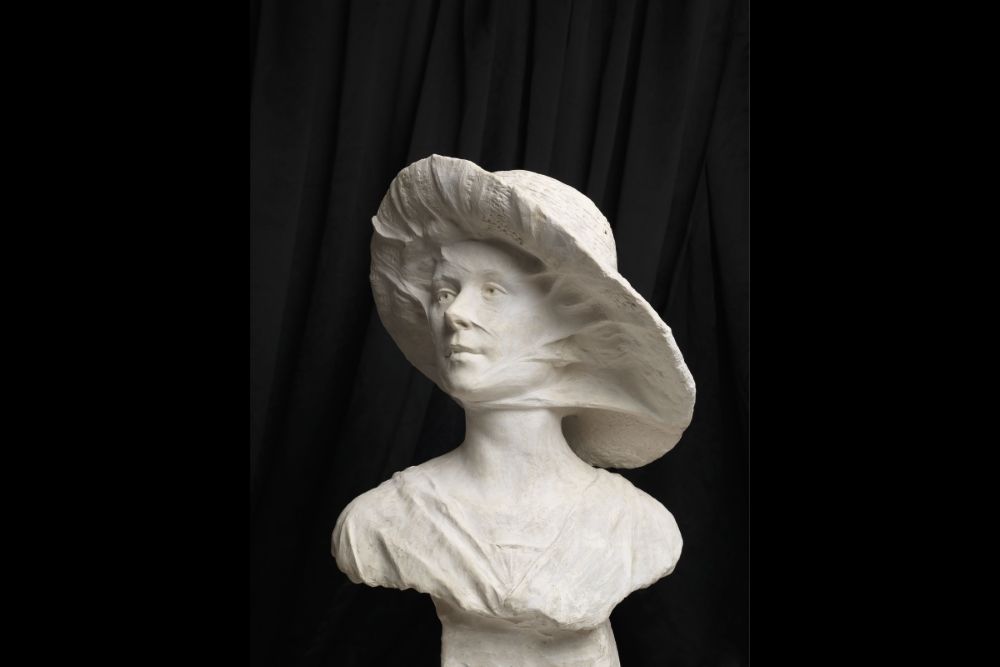
Photo: M Paternoster
The Faces of Ljubljana in the City Museum. Photo: JL Flanner
Galerija Jakopič – On until March 3 is Over My Eyes (Na moje oči), an exhibition of photographs from Iraq taken by Iraqi photographers.
International Centre of Graphic Arts – Running from Friday until March 3 2019 there will be a show of posters from Milton Glaser, while paintings, drawings, prints and from Nathalie Du Pasquier in a show called Fair Game. The latter is being promoted with the following image.
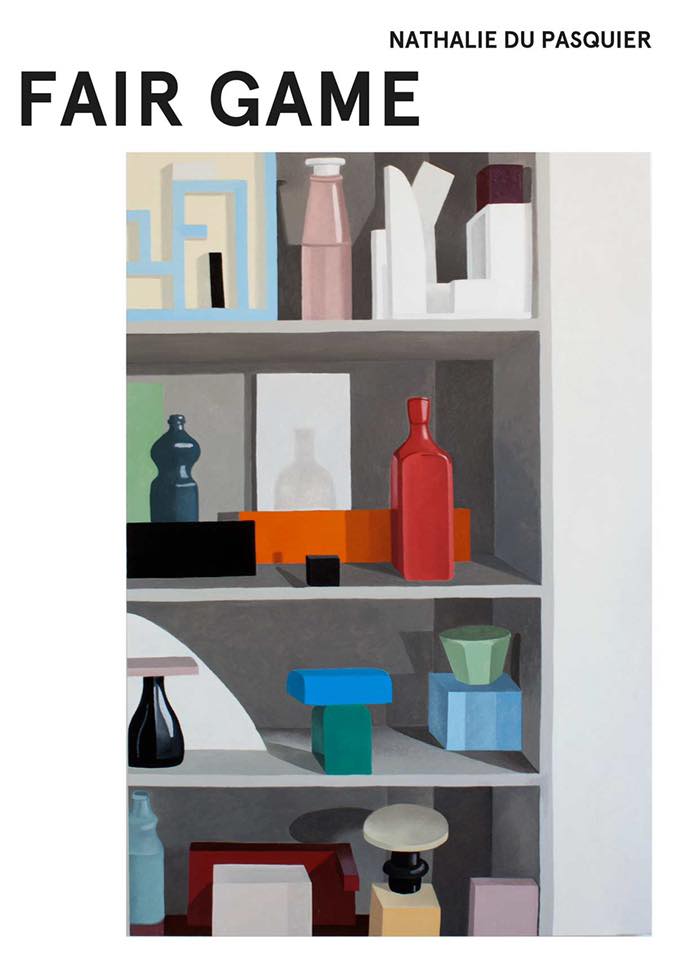
Ljubljana Exhibition & Convention Centre – Just outside the centre of town, at Dunajska cesta 18, you can see a lot of plasticized bodies at the Body Worlds Vital show, running from October 20 until January 20 2019.
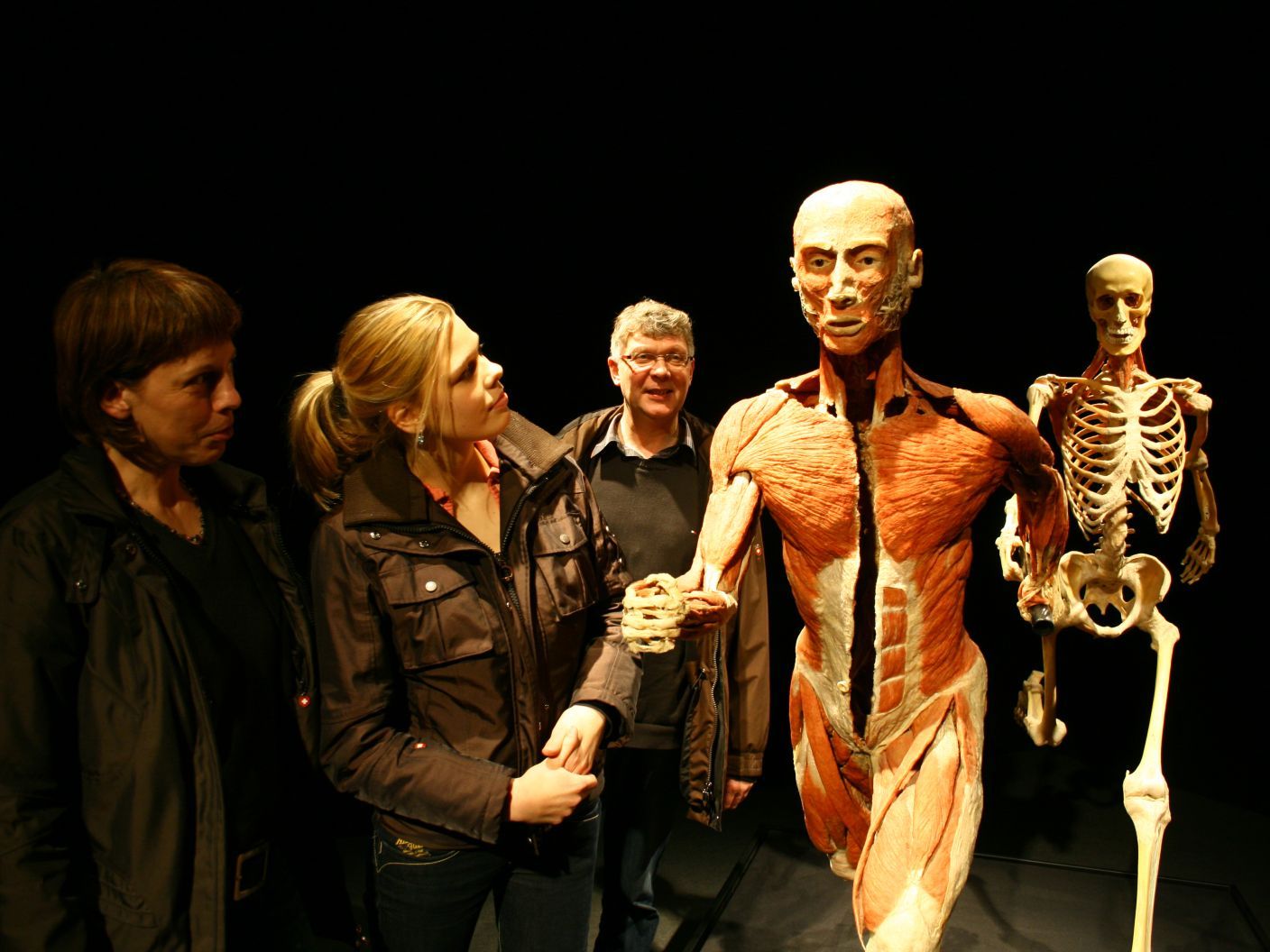
Photo: Body Works Vital
MAO – The Museum of Architecture and Design has much of what you'd expect, and until March 25, 2019, has a show on Ljubljana and it's relation with water. Until February 24 visitors can enjoy Toasted Furniture, which presents some experiments with the reuse of plastic waste, and until February 28 there's a show on Oskar Kogoj and his chairs.
Moderna galerija – The main branch of this gallery, to be found near the entrance to Tivoli Park, has a good collection of modern art, as well a nice café in the basement.
National Gallery – The country’s main gallery has “the best” of what’s on offer from the Middle Ages to non-contemporary modern visual arts, and is in a great location for exploring other areas, just by Tivoli Park and opposite the main branch of the Moderna galerija. Running until February 10 2019 is a show called Ivana Kobilca (1861-1926): But Of Course, Painting Is Something Beautiful!, featuring works like the one below. You can read about our visit to the room containing sacred art from the Middle Ages here, and see a picture from our trip after the two girls.
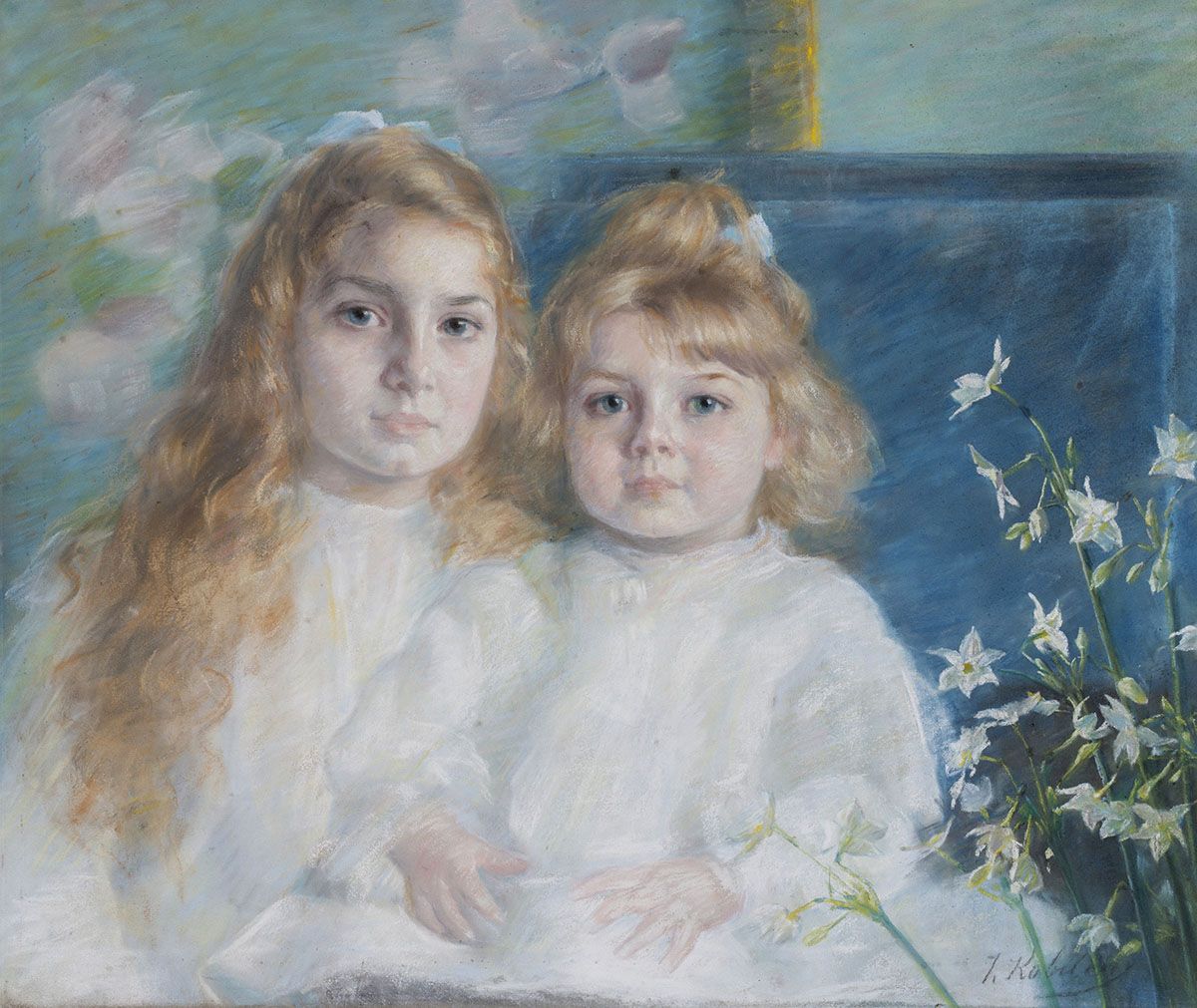
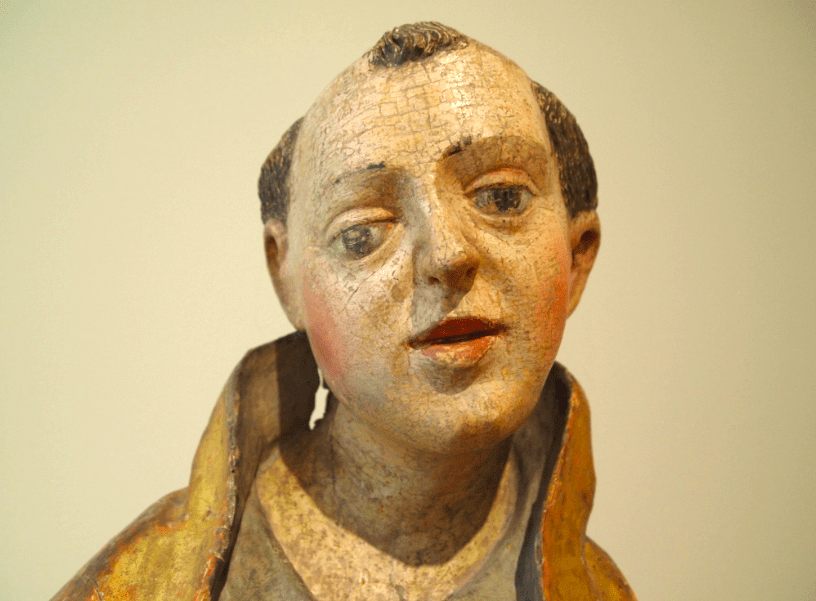
JL Flanner
National Museum of Slovenia – There’s plenty to see in the permanent collection here, from Roman times, Egypt and more, with the big draw this season being the exhibition of over 140 items of gold from Ming Dyntasy China, as reported here, and with an example below. This runs until February 15th.
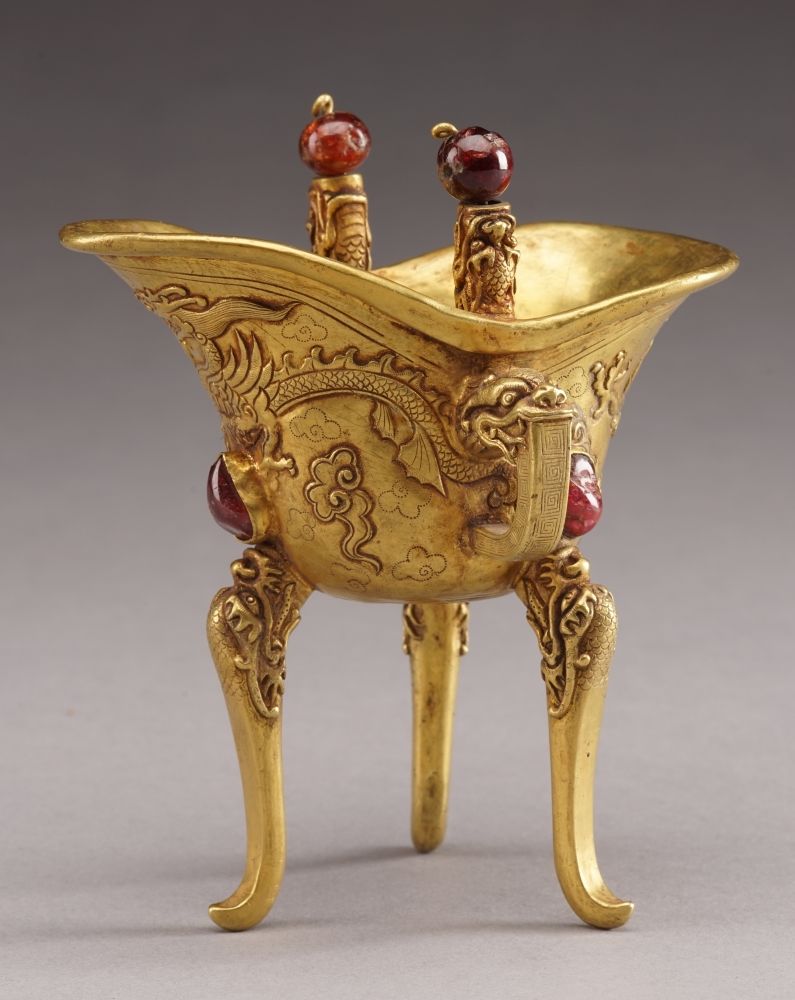
Photo: Wang Wei Chang
Meanwhile, the museum's Metelkova branch, located between one branch of the Moderna galerija and the Ethnographic Museum has some rooms on Church art, furniture and weapons, with the latter including more guns than you'll see anywhere else in town, and quite a thrill if coming from a nation where such objects are not household items.
Natural History Museum – On until the end of June 2019 is Our Little Big Sea, which takes a look at the oceans.
Škuc Gallery - You can find this in the old town, and until January 20 there;s an interesting and often moving show called Kids that you can see for just 1 euro, with works by Johanna Billing, Matic Brumen, Andreja Džakušič, Priscila Fernandes, Eden Mitsenmacher, Franc Purg, and Pilvi Takala.
Slovene Ethnographic Museum – The museum currently has a temporary show on Bees and Beekeeping, on until June 16 2019, as well two permanent exhibitions. One of these is called Between Nature and Culture, and has a great collection of objects from Slovenia and around the world, well worth the trip up to the third floor to see it (as recounted here). This place is located near the newer branch of the Moderna galerija and Metelkova.
Union is "the Ljubljana beer", but now both it and Laško are owned by Heineken. There are many local brews on offer around town, though, if you want to explore IPAs, stouts, wheatbeers, sours and so on Photo: JL Flanner
Union Experience – The Ljubljana-based brewer has a museum showing the history of the company, with the ticket also including access to part of the factory and a few samples of the product. You can read about our visit here.
It's not a formal museum, but if you're interested in "Yugo-stalgia" then you'll enjoy a trip to Verba, a small, privately run space that's crammed with objects and pop culture items from the era, and is conveniently located at the start of one of the short walks to the castle. It's also a great place to take pictures, if you leave a donation, and you can read more about it here.
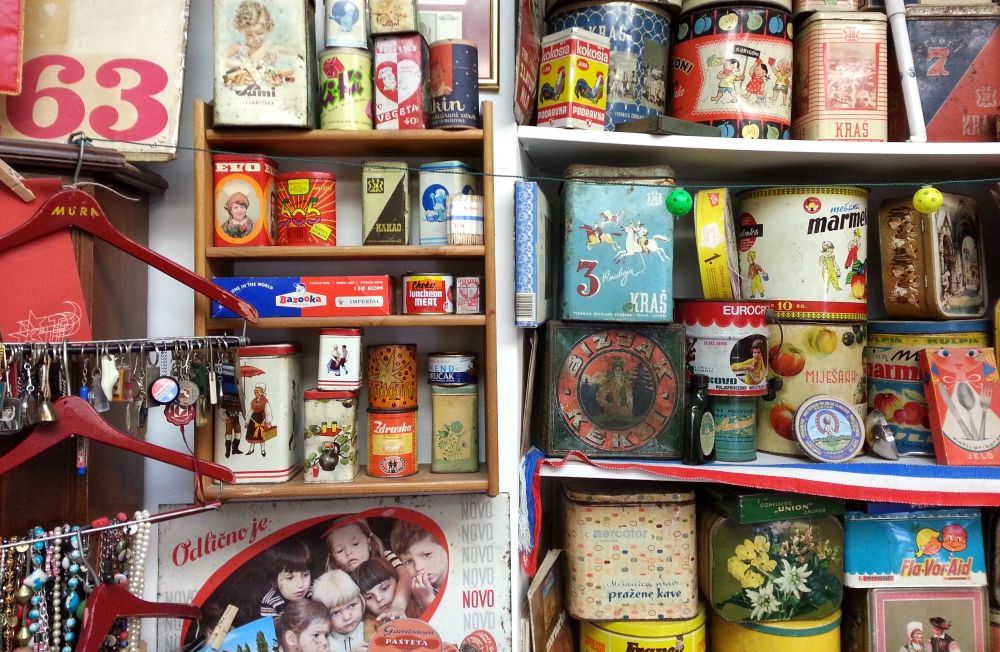
Verba. Photo: JL Flanner
Alternative Ljubljana isn't a museum or gallery, as such, but instead turns the city streets into a museum and gallery. Learn more about their tours of street art, history and LGBT Ljubljana here.
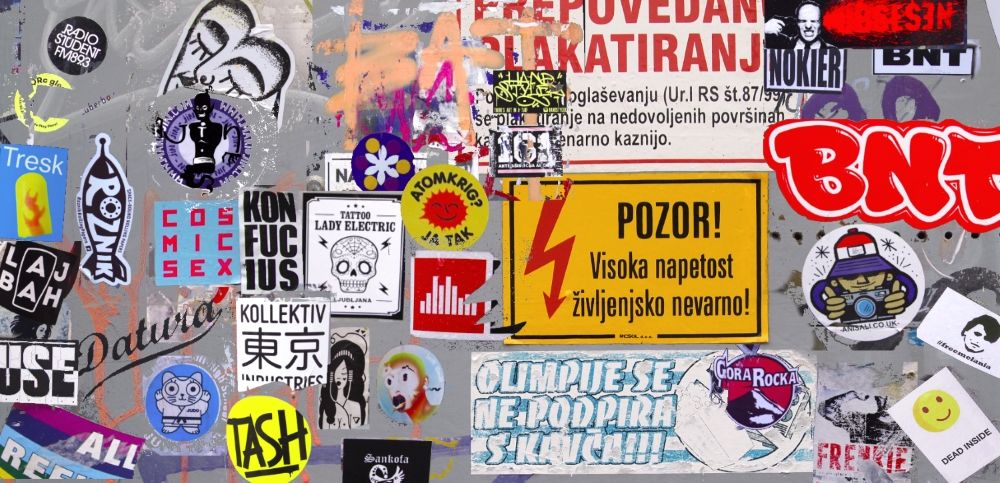
Photo: JL Flanner
Other things to do in Ljubljana
If you'd like to spend an evening painting with others, then take a look at Design with Wine, which organises painting parties on Trubarjeva cesta,
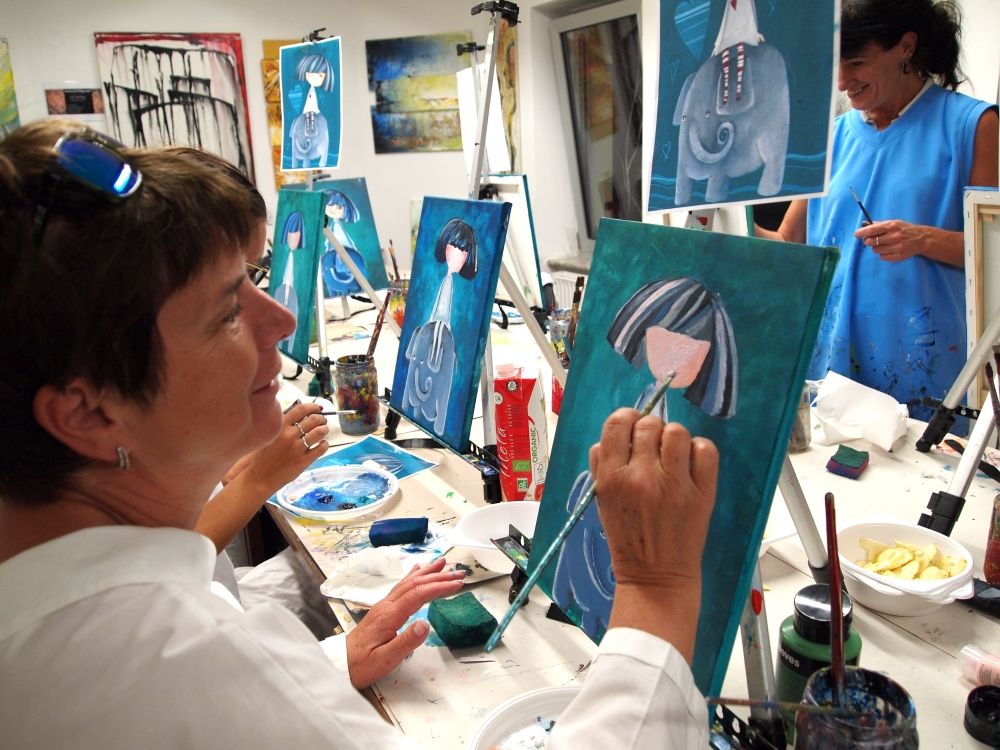
If you want to see some antiques, then check out the wonderful Antika Carniola, as discussed here. The man behind it, Jaka Prijatelj, has a fine eye for life on this street, as you can see on his Facebook account.
Photo: JL Flanner
If you’re in town and want to go jogging or walking in nature, why not take another look at the Castle, with a brief guide to the trails here. If you want something bigger, head to Tivoli Park.
And if you're bored with the Old Town, why not take a walk, cycle or boat ride to nearby Špica and enjoy the riverside life. Learn more about that here.
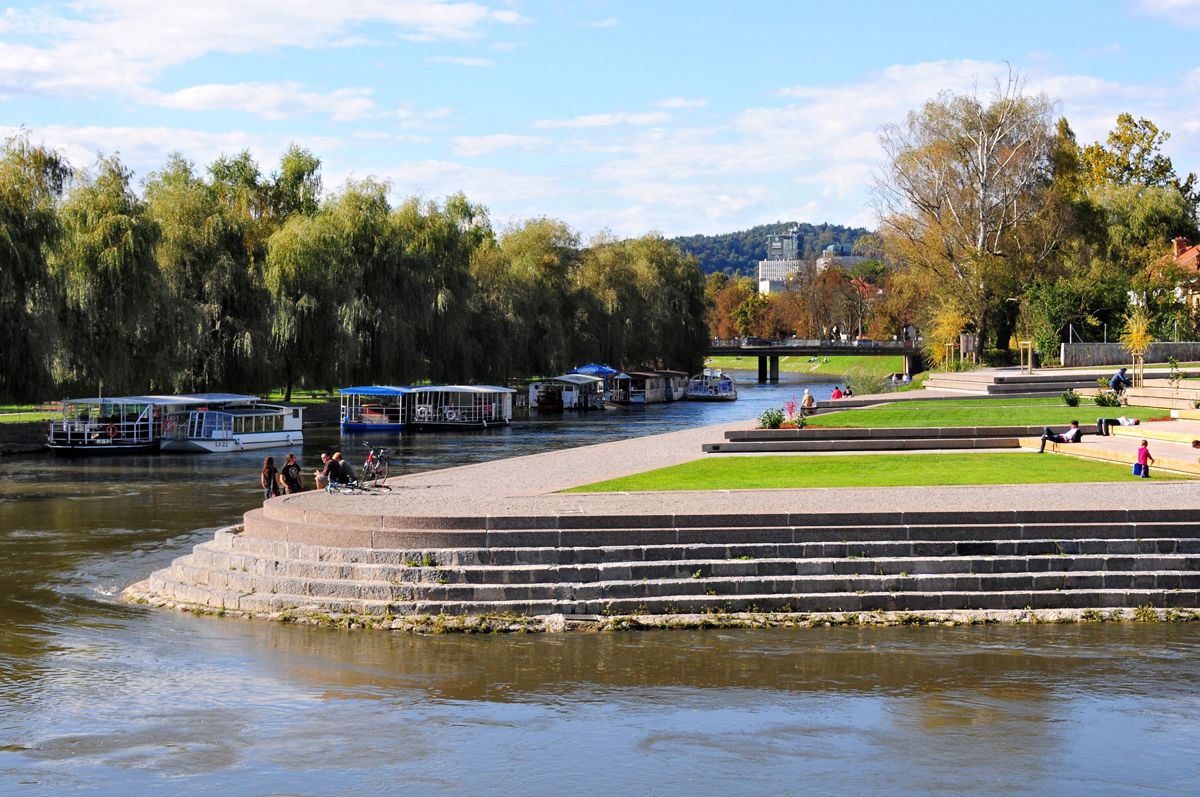
visitljubjana.si
![]()
maxpixel.net, public domain
Want to stretch and breath? Then check out our list of drop-in yoga classes for tourists, visitors and the uncommitted. If you're heading to the coast, check out our interview with a yoga teacher who offers breakfast sessions there, while if you're staying in town (or nearby) and want to try some "family yoga" then you can learn more about that here and maybe get your kids to calm down a moment or two.
There are some golf courses near Ljubljana, but even ones further away are not far, as seen in our list of all the golf courses in Slovenia. Note that these close when the snow starts, if it ever does this year, in which case you might be interested in what's new at Slovenia's ski resorts for 2019, as reported here.
![]()
Photo: maxpixel.net, public domain
Daytrips
Most of Slovenia is only a few hours from Ljubljana, and you can easily visit Lake Bled, Lipica Stud Farm, Postojna Cave, Predjama Castle, the coast and other locations, while if you'd like to take a photo of from that bench in Bled, then you can learn how to get there here. If you’re looking for something more ambitious, then check out our recent guide to the 17 members of the Association of Historical Towns of Slovenia
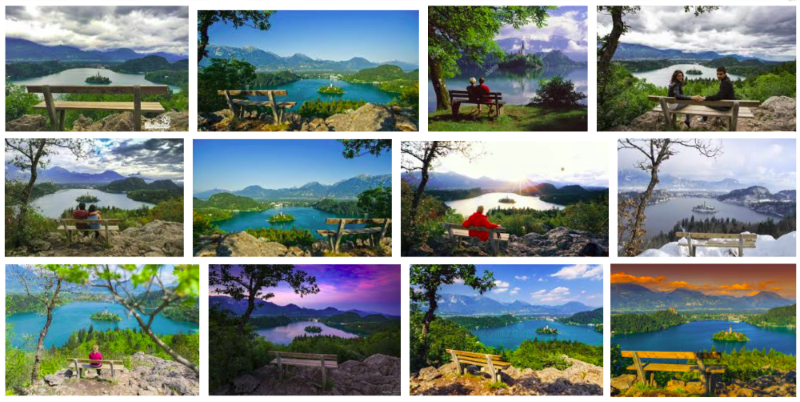
Photo: Google Image Search
Getting around
If you want to get a Ljubljana Tourist Card, which gives you travel on the city buses and entry to a lot of attractions, then you can read more about that here, and if you want to use the bike share system, as useful for visitors as it is for residents, then you can learn more by clicking this. Visitors with reduced mobility will be pleased to find that downtown Ljubljana is generally rated as good with regard to accessibility, and that there’s a free, city-sponsored app called Ljubljana by Wheelchair highlighting cafés, attractions and so on with ramps, disabled bathrooms and Eurokey facilities, which you can read about and download here. If you’re driving into town and don’t know where to part, our guide to how to park in Ljubljana is here.
There aren't many places to eat after midnight, and most of them are by the train station, as reported here.
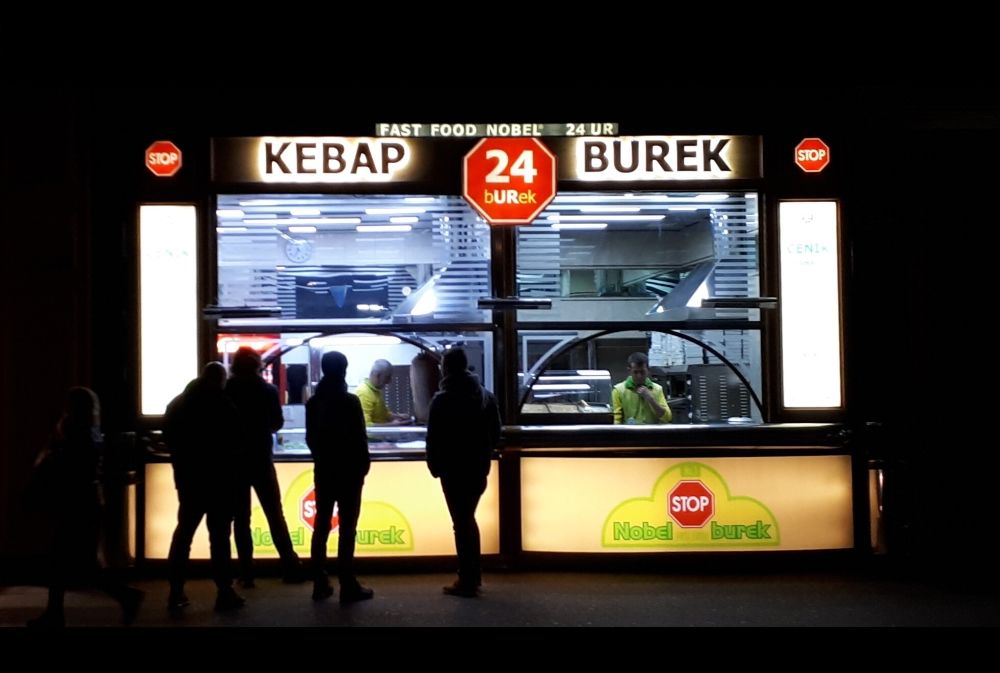
Photo: JL Flanner
Want / need cigarettes but the stores have closed? Here's an incomplete list of bars downtown that will satisfy your craving for the demon weed. While if you’re having trouble with the ATMs then here’s a guide to the Slovene you’ll see on screen. If you get a hangover then find out where to get paracetamol (and prescription drugs) in Ljubljana here, while details on emergency birth control can be found here.
Ljubljana is a small and relatively safe city, but if need to contact the police then there’s a special number for foreigners, and that’s 113.
STA, 18 January 2019 - Slovenian skier Ilka Štuhec finished second in Friday's downhill in Cortina d'Ampezzo, her third podium in three World Cup appearances this season.
Štuhec was 0.40 seconds behind the Austrian Ramona Siebenhofer, with another Austrian, Stephanie Venier rounding off the podium 0.46 seconds adrift.
The reigning downhill world champion, Štuhec made a stunning return to the World Cup after a long injury by winning the downhill and super-G in mid-December.
The 28-year-old now ranks second in the World Cup downhill standings, 68 points behind Siebenhofer. The next World Cup downhill will be held on Saturday, followed by a super-G on Sunday.
Mladina: Post-election alliances must be clear before EU vote
STA, 18 January 2019 - The left-wing weekly Mladina says in its editorial on Friday that political groups in the European Parliament should make it clear before the May elections whether they will form an alliance with the European People's Party (EPP), considering that the group includes Hungarian right-wing radical Prime Minister Viktor Orban.
Ahead of the elections, it is often heard that Europe is in serious danger of far-right populist parties getting so much power that they would influence the formation of the European Commission, Mladina editor-in-chief Grega Repovž says.
He is critical that these warnings are voiced by the very same people who already tolerate the likes of Orban and Slovenian Democrat (SDS) leader Janez Janša in their ranks. They are calling for a coalition against populist parties, many of which are already members of the EPP.
Is it even possible to take seriously conservative parties that criticise “orbanisation: and fascism on a declarative level but tolerate the problematic parties, Repovž wonders.
Related: Slovenian “word of the year” announced
"The argument used by conservative politicians dedicated to democratic and Christian values is simple: it allows them to somewhat control these parties... This is a terrifying and unconvincing argument that leads to the legitimisation of radical positions."
But the problem has wider implications. "Let us assume that populist right-wing parties outside the EPP reach more than 30% in the European Parliament in May. For the first time in history, all big political groups in the parliament will have to join forces and form a grand coalition."
But so far none of the large groups has demanded of the EPP to clean out its ranks. "Of course, this is hard. But this does not make it any less necessary," the paper says under the headline With Orban against other Orbans?
Demokracija: New think-tank not to be trusted
STA, 17 January 2019 – The right-wing weekly Demokracija expresses doubt in Thursday's commentary about the Cathedral of Freedom, a think-tank whose stated goal is to promote the establishment of a liberal party. The paper says the true intentions as well as its potential are questionable.
One of the initiators criticised the "rhetoric of patriotism and independence euphoria" on the right. This targeted primarily the Democrats (SDS), the implication being that it should be food for thought for the party's leader, the paper, co-owned by the SDS, says in Cathedral of Freedom and Seven Myths.
"I'm probably not the only one to interpret this as (yet another) appeal to Janez Janša to gradually withdraw so a generational change may take place," the paper's editor-in-chief Jože Biščak says.
"Something similar happened before last year's general election, when the noble right presented itself as an alternative to the allegedly radical and contaminated parties and individuals on the right... We know what happened at the election."
The commentator says that the proponents appear to realise that in order to change things they will have to form a liberal political party, but this looks like wishful thinking considering the fate of such initiatives in the past and the initiators' stated intention not to do the legwork required to actually establish a proper party.
The paper also expects the initiators to take a clear stance on several key issues, including how they understand freedom of speech, the coalition's attacks on opposition media, media legislation and multiculturalism.
"But more than anything, they will have to state what freedom means to them. Is it the absence of incarceration or of any kind of coercion? Is it the right to act, speak and think any way you want, without others, including those in power, imposing restrictions? The public will demand clear answers. Absent such answers this will be yet another dud."
All our posts in this series can be found here
Today’s Dnevnik has a report by Aleš Gaube examining what a no deal Brexit could mean for Slovenia. The story notes that if the UK leaves the EU without an agreement, as it’s currently set to do at midnight on March 29, then the status of Britons in Slovenia will need to covered by new legislation. The text continues on a comforting note, suggesting that not much will change for the around 720 UK nationals who currently live in the country, although it then claims they would no longer be able to buy real estate in the country (“Prav tako v naši državi ne bi več mogli kupovati nepremičnin.”). There would also be changes to how professional qualifications gained in the UK are recognised in Slovenia.
However, readers should note that no details are given with regard to these changes in status, and no official sources are cited, and also that the author of the original story seems to occasionally confuse a hard Brexit (with a Withdrawal Agreement) with a no deal Brexit (without an agreement). We also got in touch with a Ljubljana-based real estate agent, who said "citizens from OECD members can buy freely in Slovenia", so perhaps UK nationals do not need to worry on this point.
For the around 5,000 Slovenes in the UK, Dnevnik says that these should continue to enjoy the same rights set out in the Withdrawal Agreement, even in the case of a no deal Brexit. For Slovenians intending to visit the UK in the future, visa free travel to the UK should still be possible.
As the title of the article indicates – “Koliko nas bo stal trdi brexit?” (“How much will hard Brexit cost us?”) – the main focus is the issue of EU funds, a matter of particular interest in this context, since the UK is the third largest contributor to such funds. In the case of a no deal Brexit, which will see the UK not pay €16.5 billion into the current EU budget (which runs until 2020), Slovenia is expected to contribute between €42 and 57 million more to fill the hole, while Denmark would pay an extra €360 million.
David Brozina, Director-General of the EU Affairs Directorate at the Ministry of Foreign Affairs, told the newspaper that while the government is planning for all eventualities, detailed legislation will only be announced when the UK’s position, and the kind of Brexit it wants to pursue, is known. He is also quoted as saying "The Ministry of Labour is investigating the possibility that, in the event of a hard Brexit, an agreement that regulates the transfer of insurance rights and reimbursement of medical treatment costs between the countries, as was the case prior to Slovenia joining the EU”.
Finally, the paper notes that the UK Embassy in Ljubljana is not commenting as to any ongoing talks with the Slovenian government on citizen’s rights. The full story, in Sovene and behind a paywall, can be found here.
All our Brexit coverage can be found here
STA, 17 January 2019 - President Borut Pahor and the leaders of parliamentary parties decided on Thursday to draft changes to the electoral law following a Constitutional Court decision before the parliament's summer recess. However, neither the idea to change electoral districts nor the idea to abolish them enjoys enough support.
Pahor met the party leaders to see how they feel about possible amendments to electoral legislation after the top court declared last December the legislative provisions determining the size of electoral districts for general elections unconstitutional.
Since the number of constituents differs greatly from one district to another, the votes of those who cast their ballots in smaller districts count more than those cast in larger districts.
Slovenia has ten electoral units, including two single-seat constituencies for the Italian and Hungarian minorities. Each of the remaining eight units is divided into eleven districts to elect 88 MPs.
The Constitutional Court ordered the National Assembly to amend the legislation within two years, but did not decree by what method.
Pahor stressed at today's meeting that the legislation should be changed before the next election, which would be called in the spring 2022 at the latest, so as to avoid doubt about them being in line with the Constitution.
The minimum change to make the legislation constitutional would entail changing the size of electoral districts, which would require the support of at least 46 MPs in the 90-member legislature.
But if voters are to have more say about who will be elected MP, the electoral districts should be abolished, and party lists and preferential votes introduced. This would, however, require a two-third majority in the National Assembly or at least 60 votes.
Currently neither of the two proposals has enough support.
Pahor said as he spoke to the press after the meeting that experts would be invited to take part in the drawing up of the changes. He is also to meet the prime minister and the government secretary general in the coming days to discuss how government services could assist in this process.
Experts and negotiators from each deputy group will hold regular meetings to draw up the changes and Pahor will act as a coordinator. A task force will be set up to look into the possibilities of changing electoral districts, the president said.
The views of the parties on the changes remain unchanged. The coalition Marjan Šarec List (LMŠ), Modern Centre Party (SMC), Alenka Bratušek Party (SAB), and the opposition New Slovenia (NSi), Left and the National Party (SNS) favour abolishing electoral districts and introducing a preference vote at the level of the electoral units, but disagree over whether the preference vote should be absolute or relative.
The largest opposition faction, the Democrats (SDS), has been advocating a majoritarian system but its leader Janez Janša did not give any statements today. He said on Twitter that the SDS supported any change to the electoral system which would increase the influence of voters to MP's election and help decentralise the country.
Matej T. Vatovec of the Left said that merely changing electoral districts, which could not be geographically united, would be a waste of time. He urged parties not to delay the changes.
SNS head Zmago Jelinčič said that changing electoral districts would be difficult and Maša Kociper of the SAB said that merely changing the size of the districts would not increase voters' influence. She said that it was evident that the older, established parties did not want change.
The coalition SocDems and the Pensioners' Party (DeSUS) did not give any statements today and have so far been reserved about the changes or against abolishing electoral districts.
STA, 17 January 2019 - Members of the Slovenian community in Italy will be protesting against a neo-fascist rally planned in the border town of Gorizia on Saturday. The Slovene Union Party (SSk) has called on its members and like-minded people to take part in an antifascist rally planned for the same day.
The antifascists say it is inappropriate for the Gorizia city authorities to receive the fascist rally participants, X Mas and Casa Pound, which is what happened at a similar rally last year.
Related: President Pahor and Speaker Židan express concern after neo-fascist rally in Trieste (video)
"Gorizia must not accept such a decision and such behaviour because the fascist regime and terror between the two wars and during World War II caused great hardship," the SSk said in a press release on Thursday.
This year, Gorizia Mayor Rodolfo Ziberna decided against receiving the fascist rally participants after this move caused an outcry in 2018.
Klemen Milavčič, the new mayor of the nearby Nova Gorica, underlined in a press release today that "such provocations are dangerous and must not be underestimated".
He called on the neighbours of his town to act prudently, to the benefit of the whole area and with modern European values in mind.
Vice-president of the coalition Social Democrats (SD) Matjaž Nemec responded in a video on Twitter, saying that "it is our task to preserve European values: mutual respect, cooperation and building a new and modern European future".
The people of Gorizia and Nova Gorica have always fought for and built a future together, a future based on shared European values and are an inspiration for the entire Europe and the EU, said Nemec.
Below is a review of the headlines in Slovenian dailies for Friday, January 18, 2019, as summarised by the STA:
DELO
Research funding
"Dr Noč: I'm not extorting money, I want fairness": Cardiologist and researcher Marko Noč has scored just half a point below the threshold to be awarded funds to continue his successful research programme. His case was heard by the parliamentary Finance Oversight Commission yesterday. (front page, page 4)
Putin Serbia visit
"Brought promises and was given loyalty": Russian President Vladimir Putin could have hardly been given a better suited gift during his Serbia trip than a Yugoslavian shepherd dog puppy, a symbol of infinite loyalty. (front page, page 3)
Tomos receivership
"Bankruptcy manager finds Tomos in a very bad condition": The official receiver Štefan Veren finds that Tomos, the iconic Koper-based moped manufacturer, has had all of its assets sold, seized or pledged. (front page, page 9)
DNEVNIK
Brexit
"No-deal Brexit would cost Slovenia's budget at least EUR 42m": The government is drawing up a law to tackle the status of British residents in Slovenia in case of a hard Brexit. The Finance Ministry has acknowledged that the biggest impact on Slovenia would be the loss of British funds in the EU budget, as a result of which Slovenia might have to pay EUR 42m more into the EU budget. (front page, page 6) Our summary of this story can be found here
Electoral law reform
"Electoral law: Support for reform of electoral districts insufficient": After hosting a meeting with the heads of parliamentary parties yesterday, President Borut Pahor ascertained that there is not enough support for either a reform of the electoral districts or for abolishing them and replacing them with a preference vote. (front page, page 2, commentary 18)
Theatre
"Culture Ministry Commission: Mladinsko as a political pamphlet": The management of the Slovensko Mladinsko theatre is upset by the Culture Ministry's decision on distribution of funds, not because of a decrease in funding but because of the explanation which they say is full of untruths, inaccurate claims and even political undertones. (front page, page 32)
FINANCE
Electricity prices
"Were you hit by electricity bill?": Households and small business customers should check whether their electricity supplier may have ended promotion prices as of New Year. The paper advises them what to do to pay less for electricity. (front page, page 5)
Stock market
"Car companies this year's stock market hit": Investors' optimistic expectations about European car shares make good news for Slovenia's flagship industrial sector. (front page, pages 2, 3)
Koper-Divača rail project
"Construction about to begin although there's no money yet": Infrastructure Minister Alenka Bratušek has set out the investment plan for the construction of a new railway between Koper and Divača to coalition partners. What happens next? (front page, pages 4, 5)
VEČER
Gynaecology care
"Gynaecologists overburdened too": If the worst case scenario projections made by the professionals come true, one in three women may end up without her primary care gynaecologist in five years. (front page, pages 8, 9)
Alpine skiing World Cup
"Ilka defending and attacking today": Slovenia's best alpine skier Ilka Štuhec did well in yesterday's training for the Cortina d'Ampezzo World Cup downhill event today, coming behind only two rivals. She says she still has some reserve left for today's race. (front page, page 22)
Electoral law reform
"No majority to tackle unconstitutionality": Younger parties favour abolishing electoral districts, while the older ones prefer amending the size of electoral districts, but the meeting on the needed electoral reform yesterday showed neither of the solutions enjoys sufficient support. (front page, pages 2, 3)
Hospital queue-skipping trial
"Bribed to save life": The Ljubljana District Court saw the first-pre trial hearing in the hospital queue-jumping corruption scandal. (front page, page 21)


